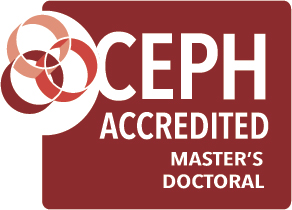Salary & Career Outlook
- ZipRecruiter reports that the average salary for MPH in Epidemiology for 2023 in Texas is $91,152.
- The U.S. Bureau of Labor Statistics reports that the national average varies from $78,240 to $126,970.
- Job outlook for the next 10 years: 28% (much faster than average).
Faculty & Staff
Learn more about our faculty and staff by visiting the CPH Faculty and Staff page.
Cost, Scholarships & Financial Aid
Total program tuition and fees cost estimates are available via the Office of Student Finance.
Scholarship opportunities are available for cohort applicants. All applications complete and verified in SOPHAS or HAMPCAS by March 15 (priority deadline) will be considered with no additional application required. We suggest submitting your application by Feb. 15 to allow time for SOPHAS verification.
Financial Aid is available to support tuition, fees and living expenses. Average loans taken for HSC’s College of Public Health students are shared by the Financial Aid office.
If you have specific questions, please contact HSC’s Financial Aid Office via:
Curriculum
Learn more about HSC’s MPH in Epidemiology curriculum here.
About the MPH in Epidemiology
- Cohort full-time: Students in the MPH epidemiology program take 12 credit hours each semester.
- On-campus: The program is offered at The University of North Texas Health Science Center at Fort Worth, TX.
- Program duration: Students complete the MPH epidemiology program in five semesters over two years, including summer.
- Fall entrance only: New students are admitted in the fall semester. There are no spring or summer start options.
- Small class sizes: Core classes range from 20 to 35 students, while concentration classes have 10-20 students. This ensures personalized attention and better interaction with faculty.
- Cohort format: The program follows a pre-determined sequence and pace, enhancing student success and fostering strong networking opportunities. The cohort model also helps in building quality relationships with peers and faculty.
- Professional development and interprofessional education sessions: Students participate in weekly interlude meetings for career and field preparation. These include alumni panels, networking events, coaching and guest speakers specific to epidemiology. Interprofessional education activities bring students from various university schools together for cross-disciplinary training. This collaborative work with medical professionals provides practical, real-life experience.
Practice Experience
Students in the master’s of epidemiology program complete an intensive hands-on experience with local public health nonprofits, governmental institutions or health systems. This experience is designed to align with each student’s field passions and career goals, providing a tailored and impactful learning opportunity.
Key components of the practice experience:
- Placement: Students complete their practice experience with organizations that match their interests and career aspirations. This can include public health nonprofits, government health departments or health care systems.
- Duration: Students are required to complete 400 hours of practical experience over the course of three semesters.
- Project work: During this period, students undertake significant projects for their host organizations. Examples of such projects include:
- Designing and implementing new educational programs.
- Supporting and analyzing extensive data sets.
- Managing policy analysis and development efforts.
- Professional development: This experience provides valuable professional references, enhances interview discussions and builds confidence in the student’s chosen career path.
Through this professional field experience, students gain practical skills, develop a network of professional contacts and enhance their resume with real-world public health projects. This comprehensive approach ensures that graduates are well-prepared for successful careers in epidemiology.
Program Overview
A master’s in epidemiology is a graduate degree focused on studying the patterns, causes and effects of health and disease conditions in populations. This program equips students with the skills to analyze data, conduct research and develop strategies to prevent and control diseases.
Key elements:
- Data analysis: Learn to collect and interpret health data.
- Disease prevention: Develop methods to control and prevent outbreaks.
- Research: Conduct studies in order to identify health trends and risk factors.
Graduates work in public health agencies, health care settings, research institutions and nonprofit organizations. The degree also can prepare them for roles like epidemiologist, infection prevention specialist and public health researcher.
Apply today in order to drive impactful change.
The master’s in epidemiology program at the Health Science Center requires a total of 48 credit hours. This comprehensive program is structured to provide a robust foundation in epidemiology and public health, equipping students with the necessary skills in order to excel in their careers.
Breakdown of Credit Hours:
- Core courses:
- Fall semester:
- BACH 5300: Theoretical Foundations of Individual and Community Health (three credit hours)
- BIOS 5300: Principles of Biostatistics (three credit hours)
- EPID 5300: Principles of Epidemiology (three credit hours)
- EPID 5313: Introduction to Data Management and Statistical Computing (three credit hours)
- Spring semester:
- BIOS 5310: Intermediate Biostatistics (three credit hours)
- EPID 5310: Intermediate Epidemiology (three credit hours)
- EPID 5318: Chronic Disease Epidemiology (three credit hours)
- HMAP 5300: Introduction to Health Management and Policy (three credit hours)
- Summer semester:
- EOHS 5300: Environmental Determinants of Health (online) (three credit hours)
- PHED 5297: MPH Practice Experience (one credit hour)
- Fall semester:
- Advanced courses:
- Fall semester:
- EPID 5314: Applied Data Analysis in Epidemiology (three credit hours)
- EPID 5320: Infectious Disease Epidemiology (three credit hours)
- Elective: CPH course, requires advisor approval (three credit hours)
- PHED 5297: MPH Practice Experience (one credit hour)
- PHED 5000: CPH Comprehensive Examination (exam on MPH core) (no credit hours)
- Spring semester:
- EPID 5312: Survey Research & Questionnaire Design (three credit hours)
- EPID 5317: Epidemiologic Surveillance (three credit hours)
- Elective: CPH course, requires advisor approval (three credit hours)
- PHED 5297: MPH Practice Experience (one credit hour)
- Fall semester:
The master’s in epidemiology program structure
The program is designed to be completed in five consecutive semesters, including the summer. Students are admitted once a year in the fall semester and follow a cohort model. This format enhances learning by fostering strong peer networks and providing consistent support from faculty. Additional time may also be required outside of class for professional development activities.
Practical experience: A significant component of the program is the 400-hour practice experience, which spans over three semesters. This hands-on experience allows students to apply their knowledge in real-world settings, such as public health nonprofits, governmental institutions and health systems.
Apply today in order to drive impactful change.
The MPH with a concentration in epidemiology at HSC includes a series of core courses designed to provide a strong foundation in public health and specialized training in epidemiology. Here are the core courses included in the program:
- Theoretical Foundations of Individual and Community Health (BACH 5300)
- This course covers the theoretical frameworks and models used in public health in order to understand and influence health behaviors and outcomes at both individual and community levels.
- Principles of Biostatistics (BIOS 5300)
- This course introduces the basic concepts and methods of biostatistics, thus focusing on the application of statistical techniques to public health data.
- Principles of Epidemiology (EPID 5300)
- Students learn the fundamental principles and methods used in epidemiology, including study design, data collection and data analysis.
- Introduction to Data Management and Statistical Computing (EPID 5313)
- This course provides practical skills in data management and the use of statistical software especially designed for epidemiological research.
- Intermediate Biostatistics (BIOS 5310)
- Building on the principles learned in the introductory biostatistics course, this class delves deeper into statistical methods and also their applications in public health research.
- Intermediate Epidemiology (EPID 5310)
- An advanced course that explores more complex epidemiological methods and their application in the study of chronic and infectious diseases.
- Chronic Disease Epidemiology (EPID 5318)
- Focuses on the epidemiology of chronic diseases, including methods for investigating chronic disease risk factors and prevention strategies.
- Introduction to Health Management and Policy (HMAP 5300)
- This course covers the organization, financing and delivery of health services in the United States, along with an introduction to health policy and management.
The Masters in Public Health with a concentration in epidemiology core classes
- Environmental Determinants of Health (EOHS 5300)
- This online course examines how environmental factors affect public health as well as the methods used in order to study these impacts.
- MPH Practice Experience (PHED 5297)
- A practical experience course where students apply their knowledge and skills in a real-world public health setting, gaining hands-on experience in epidemiology.
- Applied Data Analysis in Epidemiology (EPID 5314)
- Provides advanced skills in data analysis specific to epidemiological research, including the use of statistical software and interpretation of results.
- Infectious Disease Epidemiology (EPID 5320)
- Focuses on the methods used to study the distribution and determinants of infectious diseases and the application of these methods in public health practice.
- Survey Research & Questionnaire Design (EPID 5312)
- This course teaches the principles and methods of designing and conducting surveys and questionnaires in public health research.
- Epidemiologic Surveillance (EPID 5317)
- Covers the methods and applications of epidemiological surveillance systems used to monitor public health and track disease trends.
Master’s in epidemiology electives and comprehensive exam
- Electives: Students can also choose additional CPH courses, with advisor approval, to tailor their education to specific interests and career goals.
- CPH Comprehensive Examination (PHED 5000): An exam covering the core MPH content, ensuring students have mastered the essential knowledge and skills.
This comprehensive curriculum also ensures that graduates are well-prepared for careers in epidemiology, equipped with the theoretical knowledge, practical skills and hands-on experience needed in order to succeed in the field.
Apply today in order to drive impactful change.
The master’s in epidemiology program at the Health Science Center offers a variety of research opportunities designed to equip students with practical skills and experience in public health research. These opportunities therefore allow our students to engage in meaningful projects in order to contribute to the field of epidemiology and public health.
Research opportunities:
- Faculty-led research projects
- Description: Students have the opportunity to work alongside faculty members on ongoing research projects. These projects cover a wide range of public health issues. e.g. infectious diseases, chronic diseases, environmental health and health disparities.
- Benefits: Gain hands-on experience in research design, data collection and data analysis. You will also contribute to peer-reviewed publications and presentations at academic conferences.
- Independent research projects
- Description: Students can develop and conduct their own research projects under the supervision of faculty advisors. Therefore, allowing students to explore specific areas of interest within epidemiology.
- Benefits: Enhance critical thinking and problem-solving skills in order to develop expertise in a niche area of epidemiology. They also can potentially publish findings in academic journals.
- Collaborative research with health institutions
- Description: Collaborate with local health departments, hospitals and also nonprofit organizations on research projects in order to address community health needs.
- Benefits: Apply epidemiological methods to real-world health problems. Build professional networks and gain practical experience in public health settings.
- Practice experience research
- Description: During the 600-hour practice experience, students work on significant projects for their host organizations. This often includes conducting research relevant to the organization’s goals.
- Benefits: Translate classroom knowledge into practical applications. Gain valuable professional experience and references.
MPH in epidemiology areas of focus at HSC
- Interdisciplinary research initiatives
- Description: Participate in interdisciplinary research initiatives in order to engage collaboration with students and faculty from other departments, such as biostatistics, environmental health and health policy.
- Benefits: Broaden research perspectives and methodologies. Contribute to comprehensive public health solutions in order to address complex health issues.
- Infectious disease epidemiology
- Research projects may include studying the spread and control of infectious diseases, vaccine efficacy and outbreak investigation.
- Chronic disease epidemiology
- Focus on the epidemiology of chronic conditions such as diabetes, cardiovascular diseases and cancer. Projects may involve identifying risk factors and evaluating prevention strategies.
- Environmental health
- Investigate the impact of environmental factors on health outcomes. Research topics may include air and water quality, exposure to toxins and climate change effects.
- Health disparities
- Explore the causes and consequences of health disparities among different populations. Projects may also include assessing the effectiveness of interventions aimed at reducing health inequities.
The master’s in epidemiology program at HSC provides a wealth of research opportunities that enable students to gain practical experience, contribute to the field of public health and also prepares students for successful careers in epidemiology. Through faculty-led projects, independent research, collaborations with health institutions, practice experience and interdisciplinary initiatives, students can engage in meaningful research in order to addresses critical public health issues.
Apply today in order to drive impactful change.
A master’s in epidemiology from HSC offers a wide array of career opportunities in public health, research, health care and policy-making. Graduates can leverage their skills to analyze and address health issues within populations, opening doors to various impactful roles.
Extremely high demand roles in epidemiology
- Epidemiologist
- Role: Study the patterns, causes and effects of diseases in populations. Conduct research, collect and analyze data and develop strategies to prevent and control outbreaks.
- Demand: The particularly high demand for epidemiologists has increased due to public health crises like the COVID-19 pandemic. The employment of epidemiologists is projected to grow 27 percent from 2022 to 2032, much faster than the average for all occupations. About 800 openings for epidemiologists are projected each year over the decade, driven by the need to replace workers who transfer or retire.
- Average salary: Approximately $90,896 to $126,983 annually.
- Employment sectors: Government health departments, research institutions, hospitals and international health organizations.
- Infection prevention specialist
- Role: Develop and implement protocols to prevent the spread of infectious diseases, particularly within health care settings.
- Demand: The ongoing need to control healthcare related infections and emerging infectious diseases especially drives the demand for these specialists.
- Average salary: Typically ranges from $70,000 to $95,000 per year.
- Employment sectors: Hospitals, long-term care facilities and public health departments.
- Biostatistician
- Role: Apply statistical methods to public health data, assisting in the design of research studies and the interpretation of data.
- Demand: With the rise of big data and the need for data-driven decision-making in public health, biostatisticians are also in high demand.
- Average salary: Approximately $92,000 to $139,000 per year.
- Employment sectors: Pharmaceutical companies, research organizations and government health departments.
Explosive growth: epidemiologist jobs set to increase by 27%
- Public health researcher
- Role: Conduct studies to identify health trends, risk factors and the overall effectiveness of health interventions. Publish findings in scientific journals.
- Demand: The need for evidence-based public health practices and policies continues to grow, therefore increasing the demand for skilled researchers.
- Average salary: Around $65,000 to $99,000 annually.
- Employment sectors: Universities, research institutions and government agencies.
- Health policy analyst
- Role: Evaluate and develop health policies in order to improve public health outcomes by analyzing data, conducting research and providing policy recommendations.
- Demand: The evolving landscape of health care and the need for effective health policies drive the especially high demand for policy analysts.
- Average salary: Between $65,000 and $95,000 annually.
- Employment sectors: Government agencies, think tanks and advocacy organizations.
Additional career paths available with a master’s in epidemiology
- Environmental health scientist
- Role: Study the impact of environmental factors on human health and develop policies and programs to mitigate health risks.
- Demand: Increasing awareness of environmental health issues boosts demand for these specialists.
- Average salary: Around $91,032 and $119,789 annually.
- Employment sectors: Environmental protection agencies, public health departments and research institutions.
- Global health specialist
- Role: Address health issues that affect populations worldwide. Work on disease prevention, health education and policy development.
- Demand: High demand due to global health challenges and the need for international health collaboration.
- Average salary: Around $125,543 is the national average.
- Employment sectors: International health organizations, non-governmental organizations (NGOs), government agencies.
- Community health worker
- Role: Work directly with communities to improve health outcomes, e.g. provide education, support and resources to promote healthy behaviors.
- Demand: Growing focus on community health and preventive care increases demand.
- Average salary: Around $40,000 to $60,000 per year.
- Employment sectors: Community health centers, nonprofit organizations, public health departments.
- Survey researcher
- Role: Design and conduct surveys to collect data on public health issues, e.g. analyze survey results to inform public health initiatives.
- Demand: Essential for gathering data to shape public health strategies.
- Average salary: Around $44,000 to $81,000 per year.
- Employment sectors: Research firms, government agencies, universities.
- Health communications specialist
- Role: Develop and disseminate public health information in order to educate the public and promote healthy behaviors.
- Demand: Critical for effective public health campaigns and education.
- Average salary: Around $88,000 per year.
- Employment sectors: Public health departments, nonprofit organizations and media outlets.
In conclusion, these especially high-demand careers offer promising opportunities for graduates with a master’s in epidemiology. The skills and knowledge gained from this degree are essential in addressing current and future public health challenges.
Apply today in order to drive impactful change.
Admissions and Eligibility
To gain admission to the master’s in epidemiology program at the Health Science Center applicants must meet several key requirements. These criteria ensure that students are well-prepared for the rigorous academic and practical components of the program.
- Academic qualifications:
- Bachelor’s degree:
- Applicants must hold a bachelor’s degree from an accredited institution.
- While a background in health sciences is beneficial, it is not mandatory. Degrees in related fields such as biology, statistics or social sciences are also acceptable.
- GPA requirements:
- Please note that there is no minimum GPA requirement for any MPH program. While a 3.0 GPA is recommended, it is not mandatory. Higher GPAs may enhance an applicant’s competitiveness.
- Bachelor’s degree:
- Standardized tests:
- GRE scores:
- GRE scores are not required for admission to the master’s in epidemiology program at HSC. However, applicants can submit GRE scores if they believe it will strengthen their application.
- GRE scores:
- Application components:
- Application form:
- Complete the application through the SOPHAS (Schools of Public Health Application Service) platform.
- Transcripts:
- Submit official transcripts from all post-secondary institutions attended.
- Letters of recommendation:
- Typically, two to three letters of recommendation are required. These should be from academic or professional references who can attest to the applicant’s qualifications and potential for success in the program.
- Personal statement:
- A statement of purpose outlining the applicant’s career goals, reasons for pursuing an MPH in epidemiology and how the program aligns with their professional aspirations.
- Resume or CV:
- A current resume or curriculum vitae detailing the applicant’s educational background, work experience and any relevant skills or achievements.
- Application form:
- Professional experience:
- Relevant experience:
- While not mandatory, having professional or volunteer experience in public health or a related field can enhance an application.
- Relevant experience:
Additional requirements for international students who seek a master’s in epidemiology
- English proficiency:
- Financial documentation:
-
- International students may need to provide proof of financial stability to cover tuition and living expenses.
-
Application deadlines for the MPH in epidemiology
- Deadlines:
-
- Priority deadline for applications is March 15. It is recommended to submit applications by Feb. 15 to allow time for SOPHAS verification. Final decisions are made once applications are verified and reviewed.
-
The admission requirements for the MPH in epidemiology program at HSC are designed to identify candidates with the academic foundation, relevant experience and professional potential to succeed in this especially demanding field. By meeting these requirements, applicants can demonstrate their readiness in order to embark on a rewarding career in epidemiology.
Apply today in order to drive impactful change.
No, you do not need a background in health sciences to apply for a Masters in Epidemiology at the Health Science Center. While having a degree in health sciences can be beneficial, the program is designed to accommodate students from diverse academic backgrounds. Here’s what you need to know:
- Acceptable academic backgrounds
- Varied undergraduate degrees:
- Applicants with degrees in biology, statistics, social sciences, and other related fields are encouraged to apply.
- Degrees in non-health-related fields are also acceptable as long as the applicant can demonstrate a strong interest and aptitude in public health and epidemiology.
- Prerequisite knowledge:
- Basic knowledge in areas such as biology, statistics or social sciences can be helpful.
- The program may include foundational courses in order to ensure all students are prepared for advanced epidemiology coursework.
- Varied undergraduate degrees:
- Key admission requirements
- Bachelor’s degree:
- A bachelor’s degree from an accredited institution is required, regardless of the field of study.
- GPA and GRE:
- Please note that there is no minimum GPA requirement for any MPH program. While a 3.0 GPA is recommended, it is not mandatory.
- GRE scores are not required for admission, but can be submitted optionally.
- Personal statement and letters of recommendation:
- A compelling personal statement that explains your interest in epidemiology and public health.
- Letters of recommendation from academic or professional references who can speak to your abilities and potential.
- Bachelor’s degree:
- Professional experience
- Relevant experience:
- Professional or volunteer experience in public health or related fields can strengthen your application, but is not mandatory.
- Experience in data analysis, research or community health can be particularly relevant.
- Relevant experience:
Apply for a master’s in epidemiology today!
- Program support
- Foundation courses:
- The program may offer introductory courses to help students from non-health backgrounds gain the necessary foundational knowledge.
- These courses cover essential topics in public health, biostatistics and epidemiology.
- Foundation courses:
- Benefits of diverse backgrounds
- Interdisciplinary approach:
- The field of epidemiology benefits from diverse perspectives and skills.
- Students with varied academic and professional backgrounds contribute to a richer learning environment and innovative problem-solving.
- Career opportunities:
- Graduates from non-health backgrounds can leverage their unique skills and perspectives in various public health roles.
- The program equips all students with the necessary knowledge and skills in order to succeed in epidemiology.
- Interdisciplinary approach:
While a background in health sciences can be helpful, it is not a requirement for admission to the master’s in epidemiology program at HSC. The program values diverse academic backgrounds and provides the necessary support in order to ensure all students succeed.
Apply today in order to drive impactful change.
No, GRE scores are not required for admission to the master’s in epidemiology program at HSC. This therefore allows a broader range of applicants to pursue their graduate education in epidemiology without the barrier of standardized testing.
Key add-on points that may apply to your application:
- GRE optional:
- HSC does not require GRE scores for admission to the MPH in epidemiology program. This policy helps to make the program more accessible and as a result, reducing the stress and cost associated with GRE preparation and testing.
- Holistic admissions process:
- The admissions process at HSC takes a holistic approach, considering various aspects of an applicant’s background. This also includes academic performance, professional experience, personal statement and letters of recommendation.
- Alternative strengths:
- Applicants can strengthen their applications through strong GPAs, relevant work or volunteer experience, compelling personal statements and also supportive letters of recommendation.
- Focus on diverse backgrounds:
- By not requiring GRE scores, HSC encourages applications from individuals with diverse academic and professional backgrounds, therefore fostering a rich learning environment.
Application components that are required for the MPH in epidemiology:
- Academic qualifications:
- A bachelor’s degree from an accredited institution.
- Personal statement:
- A statement of purpose detailing your career goals, reasons for pursuing an MPH in epidemiology and also how the program aligns with your professional aspirations.
- Letters of recommendation:
- Typically, two to three letters from academic or professional references who can attest to your qualifications and potential for success in the program.
- Resume or CV:
- A current resume or CV outlining your educational background, work experience and any relevant skills or achievements.
What are the benefits of no GRE requirement for a master’s in epidemiology?
- Accessibility:
- Eliminating the GRE requirement reduces barriers to entry, making the program more accessible to a wider range of applicants.
- Focus on relevant experience:
- Applicants can highlight relevant public health experience and academic achievements without the added pressure of standardized test scores.
- Enhanced diversity:
- This policy promotes diversity by encouraging applications from individuals with varied academic and professional backgrounds.
The master’s in epidemiology program at HSC does not require GRE scores for admission. This policy supports a more inclusive and accessible application process, in order to allow applicants to focus on their strengths and experiences.
Apply today in order to drive impactful change.
Please note that there is no minimum GPA requirement for any MPH program. While a 3.0 GPA is recommended, it is not mandatory.
Key add-on points that may apply or enhance your application:
- Minimum GPA requirement:
-
- Please note that there is no minimum GPA requirement for any MPH program. While a 3.0 GPA is recommended, it is not mandatory.
-
- Enhancing your application:
- Competitive edge:
- While there is no minimum GPA requirement, having a higher GPA can make an applicant more competitive. Admissions committees look favorably upon strong academic performance, especially in relevant coursework such as biology, statistics or public health.
- Holistic review:
- HSC uses a holistic admissions process, considering other factors alongside GPA. This includes professional experience, personal statements, letters of recommendation and overall fit for the program.
- Relevant coursework:
- Strong performance in prerequisite courses related to public health and epidemiology can enhance an application. Courses in biology, statistics and social sciences are particularly important.
- Competitive edge:
- Professional and volunteer experience:
-
- Experience in public health, research or related fields can compensate for a lower GPA. Applicants with relevant work or volunteer experience are often considered favorably.
-
- Personal statement and letters of recommendation:
-
- A compelling personal statement and strong letters of recommendation can also strengthen an application, demonstrating the applicant’s commitment and potential for success in the field of epidemiology.
-
These additional considerations may strengthen your application to the MPH in epidemiology program:
- Transcript evaluation:
-
- All transcripts from post-secondary institutions must be submitted and will be evaluated to ensure the GPA requirement is met.
-
- International students:
There is no minimum GPA requirement for any MPH program. While a 3.0 GPA is recommended, it is not mandatory. However, a higher GPA, strong relevant experience and a well-rounded application can significantly enhance an applicant’s chances of acceptance.
Apply today in order to drive impactful change.
Yes, you can apply for a master’s in epidemiology at the Health Science Center with a non-health related undergraduate degree.
- The program values diverse academic backgrounds and provides foundational courses to ensure all students are prepared for advanced epidemiology coursework.
- Applicants should have a bachelor’s degree from an accredited institution.
- Relevant experience in public health, research or data analysis can strengthen your application, along with a compelling personal statement and strong letters of recommendation. This inclusive approach also enriches the learning environment and supports innovative problem-solving.
Apply today in order to drive impactful change.















Social media